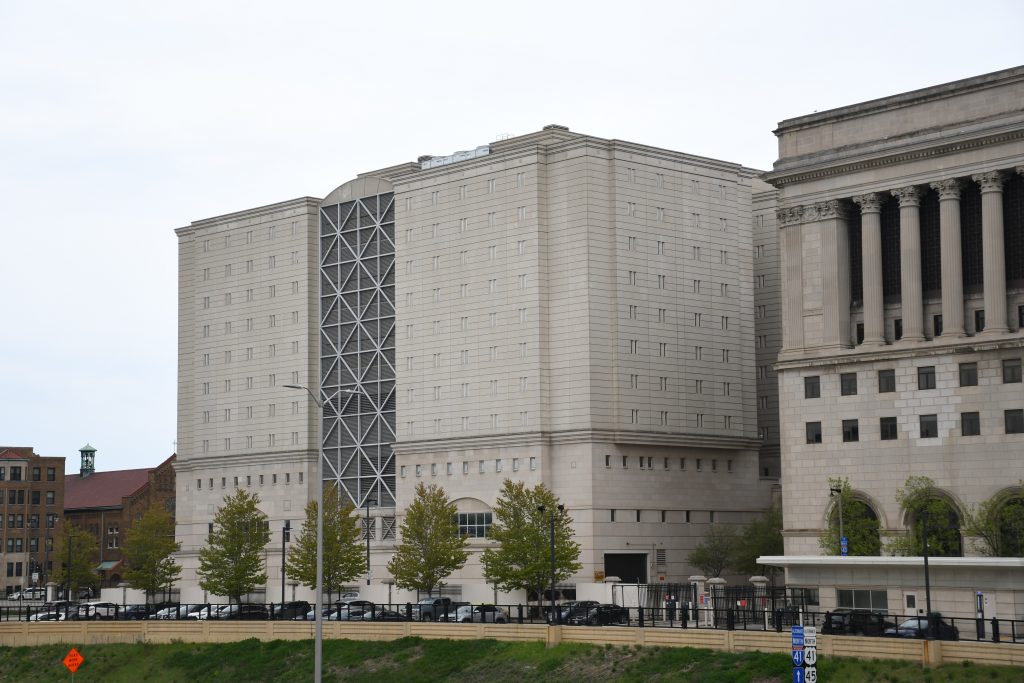Trump’s FCC Helps Out Private Prison Telecom Companies
Commission rolls back rules capping rates for phone and video calls for inmates.

Milwaukee County Jail. Photo by Jeramey Jannene.
The Federal Communications Commission (FCC) is rolling back a Biden-era rule making it cheaper for inmates and their families to call one another at the Milwaukee County Jail.
In July 2024, the FCC issued a new rule capping the prices of calls to and from inmates and eliminating fees collected by correctional institutions, which critics have charged are effectively ‘kickbacks’ from the private companies. The rule was promulgated to bring the industry in compliance with the bipartisan Martha Wright-Reed Just and Reasonable Communications Act of 2022.
The goal was to regulate the “egregiously high telephone rates” cutting people off from their family and friends while incarcerated. Maintaining these connections while incarcerated is correlated to lower rates of recidivism and supporting a successful re-entry to the community.
In March this year, the Milwaukee County Sheriff‘s Office reported it renegotiated pricing with its phone and video provider, Inmate Calling Solutions, LLC. The new contract would bring pricing in line with new caps limiting rates for phone calls to $0.06 per minute and video calls to $0.11 per minute.
In June, the FCC’s Wireline Competition Bureau issued a waiver for the rate caps and allowing facilities to once again collect site commissions. The waiver is in place until 2027. The bureau chief Joseph Calascione has worked in both the federal regulatory agencies and as legal counsel for interests in the telecommunications industry, including Deutsche Telekom, the parent company of T-Mobile.
The federal government is arguing that the rules were making it difficult for private, for-profit companies to provide correctional phone and video service. Prison justice, and civil and consumer rights organizations are fighting the waiver, filing a application for review of the public interest of the waiver with the FCC. The organizations argue that the people paying for the service, and the impact higher rates will have on them, have been left out of consideration entirely, and that the bureau didn’t have the authority to issue the order in contravention of an act of Congress.
The organizations bringing the challenge include Worth Rises, Prison Policy Initiative, Pennsylvania Prison Society, Benton Institute for Broadband & Society, Criminal Justice Reform Clinic at Lewis & Clark Law School, National Consumer Law Center, United Church of Christ Media Justice Ministry and Public Knowledge.
The new order by the FCC bureau is primarily concerned with the “unanticipated and ongoing challenges” faced by correctional telecommunications companies and correctional institutions as they allegedly struggle to “completely restructure” their services and systems to comply with the 2024 rules. The order claims the rules have become such a burden that they are impacting the private, for-profit companies ability to bid on and provide the services.
These companies “face substantial burdens in complying with the new rate cap and site commission rules within the adopted timeframes… these rules have complicated the contracting and negotiation process with carceral facilities, introducing substantial administrative costs,” according to the bureau.
Securus Technologies, a major correctional telecom company, is allegedly struggling to update its billing systems to comply with new rules requiring per-minute pricing for video calling, according to the bureau, “despite its relatively large resources, scale, and considerable in-house expertise.”
FCC Chairman Brendan Carr, appointed by President Donald Trump, announced in June that the waiver will address the challenges created by the 2024 order: “in particular, dropping the rate caps too low to cover the required safety measures and before state and local governments could secure alternative funding.”
The rules are such a burden that they are impacting the private, for-profit companies ability to bid on and provide the services, according to the bureau. But for evidence, it only points to a single press release from the Baxter County Sheriff announcing phone and video calling provided by Securus would no longer be available because of the regulation. It does, however, also state that major firms like Securus and Pay Tel Communications, Inc. have expressed concern this could happen elsewhere.
The organizations fighting the waiver argue that such concerns are speculative and there is little evidence to suggest the rules will eliminate access to phone and video calling in facilities across the country. The rules were drafted with industry input to prevent this, and even allowed for specific, individual waivers. Only three companies have sought waivers, according to the organizations filing.
“… the Bureau gave no notice and sought no comment from parties that could have collected data regarding smooth and uneventful compliance with the rules and deadlines, and deliberately blinded itself to the possibility that the record could demonstrate massive compliance with minimal disruption, in contrast to speculative claims about four or five facilities,” they argue in the application.
The FCC, the bureau and the companies have suggested the rate caps and eliminating site commissions have also made it difficult to “ensure sufficient funding for safety and security tools.”
As the organizations noted in their filing, the rules “did not prohibit the use of any safety and security measures— it only prevented [prison telecom] providers from passing the costs of some such measures through to consumers when those measures were not used and useful.”
Legislation Link - Urban Milwaukee members see direct links to legislation mentioned in this article. Join today
If you think stories like this are important, become a member of Urban Milwaukee and help support real, independent journalism. Plus you get some cool added benefits.
MKE County
-
Key Questions in Dugan Trial Take Shape on First Day
 Dec 15th, 2025 by Graham Kilmer
Dec 15th, 2025 by Graham Kilmer
-
FTA Tells Milwaukee to Crack Down on Fare Evasion — Even Where Fares Don’t Exist
 Dec 12th, 2025 by Graham Kilmer
Dec 12th, 2025 by Graham Kilmer
-
Legal Filing Describes ‘Horrid Living Conditions’ at County Jail
 Dec 11th, 2025 by Graham Kilmer
Dec 11th, 2025 by Graham Kilmer





















